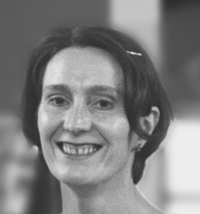My Approach
My approach to therapy is very practical: I think that it should free you from ‘symptoms’ and distress and also enable you to do things that you couldn’t do before, to feel real happiness, and to have warm, supportive relationships and a fulfilling life.
If you have had therapy before, you may find working with me quite different. I will answer all your questions and help you to understand yourself and what you are going through, target the root causes of difficulties in the present and help your brain to rewire and create more adaptive networks. You will learn to calm anxiety, make yourself feel better and stronger when you need to, trust yourself and move through the healing process more easily, and you will not only heal but become stronger, more confident, peaceful, assertive and assured. Reprocessing through EMDR therapy is like clearing away the clouds that covered the sun. It was always there; you just couldn’t see it. You may feel things that you never felt before, and be surprised and amazed by your capacity to heal.
I learned to work with developmental trauma and dissociative disorders ‘from the bottom up’, from my own experience of healing and integration through integrative psychotherapy; while practising yoga, and the many skilled teachers from whom I learned, taught me the power of working with the body to heal complex trauma. At the same time, I started reading everything I could find on understanding and working with trauma and dissociation, including the most recent developments, and attending courses and seminars; many of them are listen on my website.
The practice of psychotherapy continues to develop rapidly, informed by neuroscience and research, and I keep learning and updating my work through reading, consultation with colleagues, practising yoga and attending courses and conferences.
You are welcome to visit my website, maryclaredeechevarria.com, and email for more information.
Mary Clare
About Me
There has been a paradigm shift in psychotherapy over recent decades, and we now have a much clearer, more specific understanding of how unresolved negative experiences shape us and our beliefs about life, and how they can be healed. The word 'trauma' often seems too big for what we have experienced, but up-to-date, trauma-informed psychotherapy understands most 'symptoms' in the present as based on unresolved trauma, not only of commission (obvious trauma) but also of omission: not having things that we needed. For instance, not feeling safe, having no-one to turn to; being cared for physically but not loved emotionally; having caregivers who could not hold us when we felt intense emotions and help us to handle them, having caregivers who were depressed or grieving, or who could not see us for ourselves, rather than for our ability to meet their needs. These are experiences that many people hesitate to call 'trauma', but that shape our self-worth and self-confidence, our ability to feel deserving, and the ways in which we sabotage ourselves.
The way I work integrates many different modalities, including integrative, relational psychotherapy, Accelerated Experiential Dynamic Psychotherapy, Attachment-Focused EMDR, the Progressive Approach to EMDR, ego state therapy and work with dissociative parts, the Structural Dissociation Model, Internal Family Systems, Somatic Experiencing, Sensorimotor Psychotherapy, yoga therapy and transpersonal psychotherapy. However, EMDR is my go-to as it is the quickest and most user-friendly.
My areas of specialisation are:
Difficulties in relationships
Inability to make a decision, or to do things that you want to do, ‘stuckness’, sabotaging yourself
Acute or recurring anxiety or depression, phobias, panic attacks, nightmares, suicidal thoughts
Wanting things but believing that you can't have them or don’t deserve them
Not knowing who you are or what you want, or not being able to assert yourself
Emotional, physical or sexual abuse
PTSD
CPTSD or complex trauma (otherwise known as developmental or attachment trauma), dissociation, working with dissociative parts, ego state therapy
Bereavement, too much loss or change, loss of meaning or purpose
EMDR clinical supervision/consultation
I work with
- Individuals
- Private healthcare referrals
Special Interests
Like all UKCP registered psychotherapists and psychotherapeutic counsellors I can work with a wide range of issues, but here are some areas in which I have a special interest or additional experience.
Types of Therapies Offered
- Transpersonal Psychotherapist
What I can help with
Types of sessions
- Online Therapy
London Office
19 Nassau StreetLondon W1W 6HE
United Kingdom
View Map
Cost:
Fee: £160Please note that I am not currently working in my Central London office. Fortunately psychotherapy and EMDR work perfectly online.
Concession:
EMDR supervision/consultation - £150UKCP College
- Humanistic and Integrative Psychotherapy College (HIPC)
Bookmarks My Shortlist
All shortlisted profilesLike most websites, we use cookies. If this is okay with you, please close this message or read more about your options.


